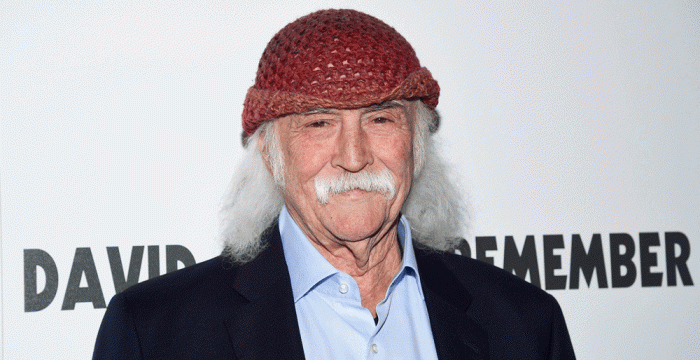“It’s not easy. It’s hard being naked in public,” David Crosby, the legendary troubadour of classic rock, reflected at Tuesday night’s New York City premiere of “David Crosby: Remember My Name.” “I don’t know what to do here. There’s no guitars, no drums,” he laughed.
Directed by newcomer A.J. Eaton and produced by the legendary Rolling Stone journalist and “Almost Famous” scribe Cameron Crowe, “Remember My Name” is an unblurred, deeply personal look at the long-troubled life of David Crosby, whose rise to fame as a founding member of The Byrds and tenure with Crosby, Stills, Nash & Young is inexorably tied to a few of this country’s most transcendent artifacts of cultural and music history.
“They’ll see a real guy. They’ll see who I am. And I think it’s better that they see an honest portrayal than they see some kind of fake. At least they can learn from what they see,” Crosby told Variety on the red carpet. Following the artist along a 2017 tour, “David Crosby: Remember My Name” depicts the 77-year-old as he contends with the inevitability of death, and, through memory, traces the course of his 50-year career, portraying a musician whose battle with drug addiction, ego and anger fueled a volatility that’s cost all but the music he made. For Crosby, that’s the point.
“Documentaries these days are shine jobs. They generally do not tell you the truth. They tell you ‘Oh, I discovered California, and right after that I invented electricity, and aren’t I cute?’ And I’m not. I’m not cute,” Crosby said at the premiere. “I’m a difficult guy and I’ve been through a whole lot of stuff. I’ve done some good work. If you want to see a documentary, you want to know about that person. You want to know what’s going on in their head. You want to know what they care about. You want to know what matters to them. What they’re afraid of. Who they love. At least that’s what I want to see.”
Without Crowe, whose interviews (which span 40 years) with Crosby guide the audience through the artist’s life, it’s likely that the beating, vulnerable heart of Crosby’s story would be missing. “Once Crosby and Cameron started talking together, it was a whole new picture because of their rapport,” said director Eaton, who partnered with Sony Pictures Classics to make the film. “Cameron has known Crosby since he was sixteen years old, and he trusts him.”
Crowe first interviewed Crosby in 1974, shadowing a Crosby, Stills, Nash & Young tour for Crawdaddy Magazine. Crosby told the then 16-year-old: “My morals are questionable, that’s true, but what do you want? I’m basically a pretty simple dude. There’s only one thing I’m really good at and that’s singing harmony and writing in groups.”
“And he’s still that same person,” Crowe reflected on Tuesday night’s red carpet, held at the Roxy Hotel. “I remember him saying that. And there’s a lot of life that he’s lived in between then and now.”
Eaton’s film is deeply existential, perhaps in a way no rock documentary has been before. At its core are questions of mortality and death, of time lost and life lived too hard. Having ridden the insurmountable highs and subterranean lows of rock and roll, and having lost much and many to drug addiction, Crosby confronts a frighteningly mortal question in the film: why did he survive when others surely didn’t?
“He should have been dead,” Crowe said. “And I think sometimes when people go through a drug phase or a self-destructive phase — a part of them dies. They don’t quite resurrect again. They might be in better health, but there’s kind of a vacant, not present feel that you get. Not him. His central spirit has always been pure. Music is what he wants. He tells you in the beginning of the movie: ‘I would trade anything to keep my music alive.’ He’s still that guy, but he’s tempted death in every possible way since. And music is still his salvation.”
It’s a story best told right now, says Crowe. “Why not tell it while he’s alive and ready to talk?” he asked. “Let’s avoid the sanctimonious ‘Oh, we’ve lost a legend’ feel. The legend’s ready to talk. Right now. And he’s got a f—ing amazing memory. They may not be around forever. You may not be around forever. Get it down for history.”
Source: Read Full Article

